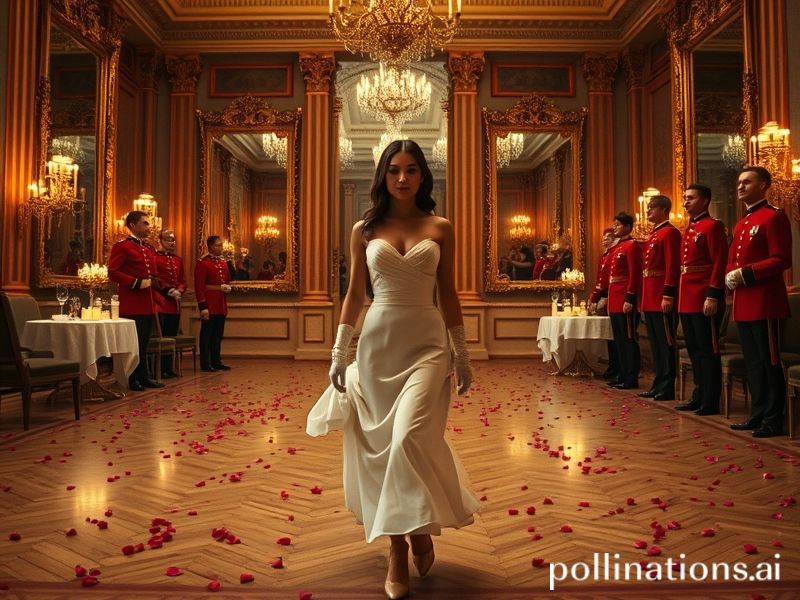The Regency Empire Strikes Back: How Bridgerton Became Global Soft-Power Colonialism in a Corset
The Regency Empire Strikes Back: How Bridgerton Became the Soft-Power Colonialism We Never Knew We Needed
By an Underfunded Correspondent Still Bleeding Netflix Subscription Fees
PARIS—On a recent evening in the Marais, a French friend dragged me to a “Bridgerton-à-la-française” pop-up ball, promising champagne, powdered wigs, and the faint hope of post-pandemic flirtation. Instead, I found German tourists live-tweeting their corset-induced asthma, a South Korean influencer staging a pre-engagement photo shoot, and a Ghanaian DJ spinning string-quartet remixes of Bad Bunny. Somewhere between the macaron tower and the inevitable police fine for overcrowding, it hit me: Shonda Rhimes hasn’t merely resurrected Regency romance; she has staged a velvet-gloved coup d’état across 190 countries, and we’re all too busy fainting on fainting couches to notice.
The numbers are as vulgar as Lady Featherington’s taste in brocade. Netflix claims Bridgerton’s third season opened to 45.1 million “views” in its first four days—statistically indistinguishable from the population of Argentina, if Argentina had Wi-Fi in every estancia and a fetish for waistcoats. In India, the series is subtitled in four languages, inspiring Delhi fashion houses to hawk “Nehru-cum-Darcy” sherwanis. Meanwhile, Brazilian TikTokers have repurposed the show’s orchestral covers of Billie Eilish into funk carioca tracks, proving once again that cultural imperialism is most effective when it can be twerked to.
But soft power rarely announces itself with trumpets; it prefers violins. Bridgerton’s true genius is packaging Britain’s most shameful centuries—slavery, enclosure, the invention of income inequality—into a multiracial fever dream where Black viscounts sip tea and nobody mentions the Royal African Company. It’s as if the British Museum suddenly started returning looted artifacts, but only after gold-plating them and adding a gift shop. International audiences, weary of their own national embarrassments, gratefully inhale this opiated nostalgia. Germans get to ignore the 20th century, Americans can pretend January 6 was just an unusually spirited cotillion, and the British finally achieve post-Brexit relevance by exporting the one commodity they still dominate: self-mythology in 4K HDR.
Of course, no empire is built without subcontractors. The show’s global wardrobe supply chain stretches from Indian zardozi embroiderers (working overtime to meet Etsy demand) to Italian silk weavers now frantically googling “how durable is taffeta for jollof rice accidents.” Jewelry sales in Lagos spiked 300% after the Queen Charlotte prequel; Lagosians, ever pragmatic, noted that lab-grown diamonds look just as good when your national currency is having a nervous breakdown. Even the Kremlin couldn’t resist: Russian state television recently accused Bridgerton of “weaponized decadence,” which is arguably the most honest review it has received.
Critics—those professional joy-stranglers—complain that the series sanitizes history. They miss the point. Sanitization is the product; history is merely the packaging, shrink-wrapped like a supermarket chicken. In an era when real monarchies teeter (Spain’s ex-king is in Abu Dhabi exile, Thailand’s playboy ruler just grounded another Boeing 737 for “mood swings”), Bridgerton offers monarchy as aesthetic, not governance. It’s Versailles without the guillotine, Windsor without the Oprah interview. Viewers from Lagos to Lima can cosplay aristocracy for the cost of a Netflix subscription and a polyester corset that will disintegrate after three hand washes—fast fashion for the end of the world.
And yet, beneath the froth lies something unsettling. While we binge, the actual Bridgertons—global elites whose wealth accumulation makes the 19th-century ton look socialist—jet between COP28 and Davos, offsetting carbon with the same moral clarity the show applies to race relations. The series reassures us that hierarchy can be sexy, provided the lighting is flattering and the soundtrack is Vitamin String Quartet. It’s a bedtime story for late capitalism: don’t guillotine the rich; flirt with them at a garden party and hope they marry your sister.
Still, one has to admire the efficiency. Britain lost an empire and gained a streaming service. The rest of us lost the plot and gained a ballroom scene. As I left the Paris pop-up—past the rented barouche now double-parked by a Lime scooter—I overheard a tipsy Swede announce she was naming her unborn daughter “Daphne.” Somewhere, an actual Daphne in Nairobi was ghosting a Hinge date arranged during load-shedding. Both realities are equally fictional, but only one comes with orchestral Beyoncé. Pass the champagne; the empire is dead, long live the binge.







